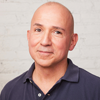
They weren’t born yet when the AIDS epidemic began. In 2015, according to the Centers for Disease Control and Prevention, youth ages 13–24 accounted for 22% all new HIV diagnoses in the U.S. They are a new generation not only dealing with HIV, today’s millennials (those born between 1982 and 2004) are confronting it head-on.
“The photo shoot [for this issue’s cover of POSITIVELY AWARE] gave me an opportunity to step into my truth,” says Dante Core (pictured above at right). “It’s a way of advocating, for myself and for others.”
“I’ve never had that feeling that this was the end of the world,” he adds. “As I became HIV-positive, I learned to become more positive as a person. It’s okay to be flawed. It’s okay to be vulnerable. Respect yourself, respect your body, be more mindful of yourself.”
Because he has dealt with homelessness on and off for six years, Core was concerned he might not be able to stick to anti-HIV treatment, rendering any medication ineffective against the virus. It’s only been within the past year that his housing situation has stabilized enough that he has begun antiretroviral treatment.
The 26-year-old, who identifies as “queer,” learned he was HIV-positive about three years ago through someone he had been seeing, but who hadn’t told Core that he had HIV.
“Instead of hating him, or lashing out, I chose to love him,” Core says. “It’s about loving yourself, not about what someone else did to you. You have to make peace with yourself and feel worthy of love. He felt he was unlovable because he had HIV.”
Darnell Thurmond, 25, is a same-gender-loving man who works at TPAN as a retention specialist, helping people living with HIV stay in care.
Through his involvement with a gay-straight alliance at school Thurmond came out to his family when he was 14. While his foster father accepted him, his foster mother did not, having bought into a number of sexual stereotypes about gay men.
“My mom would use the word homosexual,” Thurmond says. “I didn’t like the word.” As a result, he felt stigmatized.
“A lot of my friends see how I’ve changed and grown,” he says. “I used to be a person who would stereotype and stigmatize myself. I used to judge myself. I grew up in a religious household. I always knew I was different. I had to tell myself I was okay.”
Although he is negative, Thurmond works to help youth who might be going through similar stigma he faced.
“I want people who are living with HIV to feel no different from anyone else,” Thurmond says. “They are equal.”
—Rick Guasco


